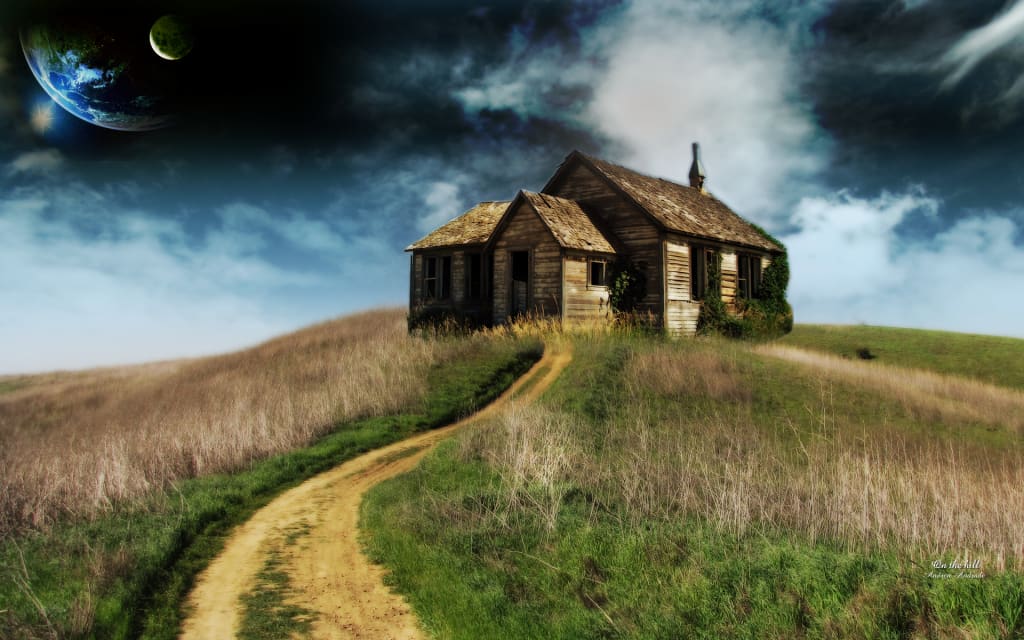A House On The Hill
An social allegory about a country divided

There was a house built high up on a hill. This house was fashioned to be a shining beacon of freedom and a mansion for every man. Those that built this house reaped the resources around them by cutting down the trees, sawing the wood, laying down the foundation and positioning the corner stone perfectly. The architects truly had a master plan in mind when they erected this edifice. They carved and cut out the windows and furnished the house with the finest furniture making it a place of comfort and protection from the elements. Once the builders and the architects finished, they looked upon it and said “this truly is a fine house, spacious and comfortable with many rooms and enough beds for everyone and for all whom built it. Every hand that laid bricks for this house should have a say in how it is furnished and should have a room in it, a bed and should be able to eat from its kitchen—all who worked shall eat.” Upon hearing this, the architects and the builders all agreed and immediately began preparations to move into this new mansion built by the many. But, while some were making their preparations, others looked inside the house, looked at its many rooms and though it were a spacious house, abundant in every way, inside of these men was nothing but a spirit of lack. That lack, they projected onto the house and its rooms. “If Everyone gets a room, the less rooms we get” they said to themselves. “Why should we share with them, when we can have more?” they thought to themselves. Suddenly, the abundance of rooms appeared to them as not enough, the space suddenly shrank before their eyes and the hallways didn’t seem as long. So, the architects dichotomized the builders into groups: their group and the other group, the superior and the inferior, the worthy and the unworthy, the old and the young, the citizen and the foreigner, the majority and the minority.
A terrible injustice was implemented, in the sense that the architects divided the workers into grades, divvying up access to the house, allowing the few that they found worthy, the few that they saw as their equals access to the inside of the house built by all hands. The others they relegated to the outside, not allowing them to come inside and denying them access not only to the comfort inside of the house but even to the front porch. If the undesirables were ever to come to the house to interact with those allowed to live within, they were only permitted to go to the back door. If they were to eat from the kitchen, they were given scraps and not the fine meats from the fridge. When they felt sleepy, they had to sleep outside, only knowing the cold for comfort and the hard ground for a bed.
Nothing stays the same forever; change is the only constant. The House had become a habitat for inequality, a castle that caste built. Yet, the luck of the architects one day ran out and that which they had erected eventually ran its course because on one fine day a fire started. No one knows who started the fire. How it came about is not important, but the fire raged on and consumed the timbers, burned the rooms, spread down the corridors and hallways and turned what was once heavenly and comfortable into a torrential hell. The fine abode of the few suddenly became engulfed in the flames of transformation, some of the inhabitants were able to escape but others were stuck inside. “They screamed for help but none came. The flames that made men inside of the house sweat and tore their skin from their bones and melted it like molasses, became a welcomed warmth to the many left outside in the cold. One groups’ curse became another groups’ comfort.
There is an African proverb that says “When the youth are not initiated into the community, they will burn it down just to feel it’s warmth.” A house divided cannot stand, but this proverbial house wasn’t even divided, being that you can never divide what was never united. Worse than that, the house was designed and built by the many, but the many that had been denied access to the house and had no reason to maintain it, instead they’d rather let it burn down so that they may start anew. The older members had not renovated the house, they had not added new rooms nor made any upgrades. Too many old folks simply figured that if the house worked for them, if the rooms were to their liking, then there was no need to change anything about it. When the youth suggested changes that could be made, they were hushed, silenced or ignored. Many of the older ones had developed an individualistic mindset, where they simply felt that they only needed to take care of themselves. They saw no reason to amend the house for any reason, they didn’t seem to value adding value to the house for perpetuity or their progeny. This created a in values, the old not embracing or empowering the youth, nor initiated them into the house, or shall I say, the community, in any meaningful way.
By the time the house on the hill had been emaciated down to the frame, many of the women had gathered outside, treating it like a campfire, being that from their perspective it had become a comfy gathering spot to meet, greet and chat. When the house was still standing, a select few were allowed into the house, as long as they came in silently, not moving anything, not touching anything and certainly not pointing out where the dirt was. Those that were allowed in weren’t allowed unadulterated access to the house, they were mostly relegated to the kitchen. They were allowed in to cook and clean and if they refused, if the demanded the same access as the men, then they were thrown out into the cold. Those that were thrown out, now, see no reason to put out the fire. Instead, they brought their marshmallows and cooked them over a fire that their intuition insinuated would come a long time ago.
The multitude of builders had long ago been divided into castes—high caste and lower castes, the castes of haves and have nots. There was even a caste in the middle. The house had become a castle that caste built. Only those who were considered among the high castes were allowed inside of the house, the middle castes were only allowed on the porch, yet the low castes, were only to come to the back door if they were to come at all. The insulting fact was that the have-nots and the low-born did most of the work building the house, and being that they were the majority, they were still deemed inferior to the higher born ones and denied the ability to reap any fruit from the seeds they had sown. Those low-born who were relegated to the cold. Initially, they sought to protest that they be brought into the bosom of the house, but once the edifice caught fire, they no longer desired integration into a burning house. From outside in the cold, their perspective informed them that the fire was welcomed, essentially being a type of transformative beacon of light lending them news of a newer, better future. “Let it burn!” they shouted.
Perspective is everything, in fact it is priceless. Mastering the art of perspective allows you to approximate yourself closer to the truth of a scenario. Perspective, peppered with empathy and compassion can open up a whole new way of seeing the world. It opens the way for you to exit see the realm of relative truth, which is a product of an individual’s vantage point, to envision the whole truth. Empathy allows one to put themselves in another’s shoes and see life through another’s lenses, seeing things as they see it and feeling things as they feel it. Those within the house failed to do this, they only thought of their individual comfort, only pondered their own price and worth. They cared nothing for those whom they put out in the cold, yet when it came time for them to be saved from the flames, they could only look aghast as the same apathy they gave out suddenly came back in their face. Humans often do this, our humanity can often only be skin deep, literally, or either only given out to those who share our gender. Privilege that we inherit, we often misconstrue with our personal worth, looking down on those who weren’t born with it, saying “Well, if they only worked harder,” as if we worked for everything that we were born with. Humans often lack humility, allowing their heads to sour among the clouds and their egos to grow to gargantuan sizes—only making the fall from the tower that much more painful.
How do we put out this fire? Where do we even start? Can we? Perhaps, the flames have caught to the point where we won’t be able to save the old house, we may not even want to salvage the old house, it was built by everyone but wasn’t intended for everyone. The seeds of apathy sown have grown and have now come back to own faces. The youth, the women, the minorities—all have no desire to put out the flames and would now have them make way for another, grander construction to replace it, thus any attempt to salvage the old house will be met with vigorous resistance. Perhaps, the best the old builders and architects could do would be to save what little of the house they liked that could work for everyone and invite those previously left out to be included in the process of building the next house. Perhaps, a more democratic, inclusive and flexible process would ensure that marginalized groups and future generations, the latter of which, will assuredly have different ideals than we do, are brought into the fold and will be able to add their vantage points to the greater picture, creating a more robust picture, and ostensibly, a more robust and perfect union. After building that house, buttressed by better and more ideas, actually integrating the disparate groups into the house would be the final nail in the coffin of inequality. Empathically, only when people have a stake in something do, they have viable reasons to perpetuate and maintain it. I would dare venture to say that in the past, too many groups, communities and genders have had their energies and presences taken for granted. The enfranchised have often expected the disenfranchised to participate in the maintenance work without ever benefitting from the comfort within, expecting too many people to cook the food without ever being allowed to taste it. Thus, this analogy ends where it began, with the builders who do the dirty work and architects who planned it all out. Going forward with different plans, we the people, builders of the house on the hill, can avoid the fire next time.
About the Creator
Robert Burton
A world traveler and student of life, people and the human mind. I've been molded by my origins in The American South, six years of life in The People's Republic of China and my passion for life. I live, I learn and then I write about it.






Comments
There are no comments for this story
Be the first to respond and start the conversation.